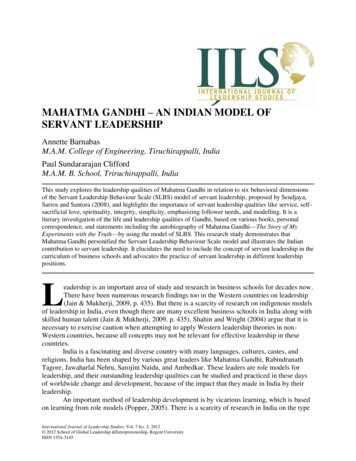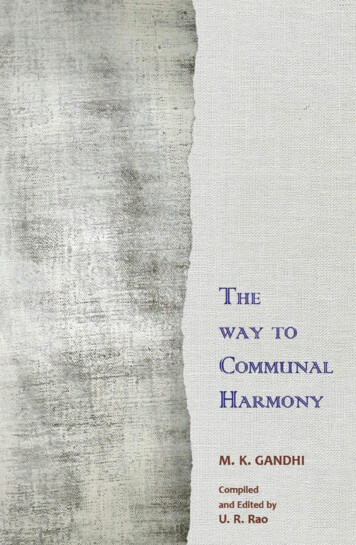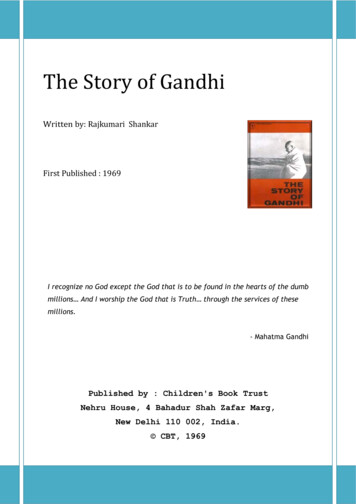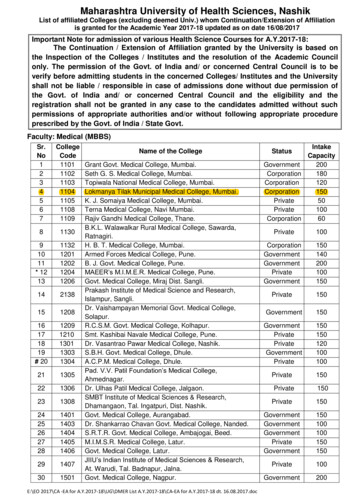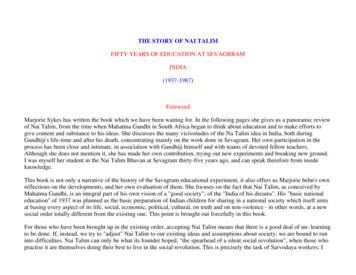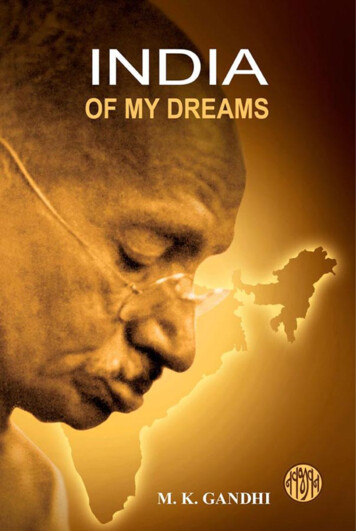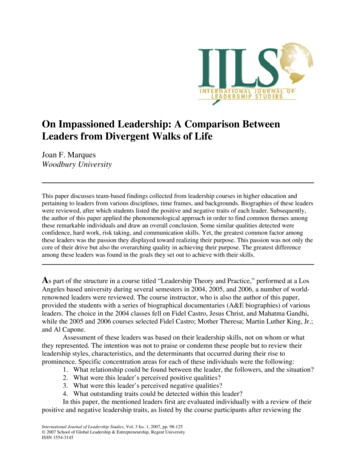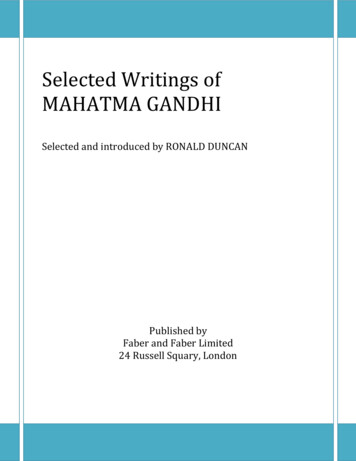
Transcription
Selected Writings ofMAHATMA GANDHISelected and introduced by RONALD DUNCANPublished byFaber and Faber Limited24 Russell Squary, London
Selected Writings of MAHATMA GANDHIACKNOWLEDGEMENTSThe Editor wishes to acknowledge with gratitude the assistance he has receivedfrom Admiral Earl Mountbatten of Burma, the High Commissioner for India, Mr.Devedas Gandhi and Shri Pyarelal, in collecting this material; and also thepermission to reprint it, obtained from the Nawajivan Trust, The Marquess ofLinlithgow and Sir Robert Tottenham.The frontispiece is reproduced by courtesy of His Excellency the HighCommissioner for India.www.mkgandhi.orgPage 2
Selected Writings of MAHATMA GANDHICONTENTSIntroduction by Ronald DuncanPART IAnasakti Yoga, or The Gospel of Selfless Action; An extract from Gandhi’sCommentary on The Bhagavad Gita.PART IIThe Gita and Satyagraha; The Philosophy of Non-violence and The Doctrine of theSword; A letter From Tolstoy to Gandhi.PART IIIThe Practice of Satyagraha or Civil Disobedience; The Passive resister’s disciplineand method; the growth of Congress; Satyagraha and Nazism; Satyagraha as ameans Of national defense; an appeal to England; Ahimsa and Himsa; Fasting as amethod of passive resistance.PART IVA reply to the poet, Tagore; Politics and Religion; Advice to Satyagrahis in anIndustrial Strike; A letter to the Viceroy Inaugurating the Non-Co-operativeMovement; An appeal to his followers; The Swadeshi Movement.PART VReport of the Trial of Mahatma Gandhi; A letter to Mahatma Gandhi from prison.PART VIBrahmacharya; the virtue of chastity – Caste, and Hindu Muslim Unity –Monoculture in Education – The Untouchables – Hinduism.PART VIIExtracts from Gandhi’s Diary kept during his residence In Delhi after India hadachieved Dominion Status up to the time of his assassination.PART VIIICorrespondence between Mahatma Gandhi and Lord Linlithgow, Viceroy of India.PART IXAphorisms.BIBLIOGRAPHYwww.mkgandhi.orgPage 3
Selected Writings of MAHATMA GANDHIINTRODUCTIONWhat are my credentials for making this selection or for writing about MahatmaGandhi? The reader has a right to ask that question. Before he can assess theaccuracy of an account, he must first know something about the historian. There isno such thing as complete objectivity especially in human relationships and wedelude ourselves when we pretend that there is. Though detachment must alwaysbe the biographer’s aim, he can never achieve it; and more often than not hesucceeds in revealing nothing but himself. This being so, perhaps he should in thefirst place admit to those factors which have probably limited his vision and thusgive the reader the chance to make adjustments accordingly. With this purpose inmind, the following facts concerning myself may not appear wholly irrelevant.In 1937 I was only twenty-two, and that is probably not the best age at which onecan assess the achievements or the personality of a philosopher of sixty.Furthermore, the nineteen-thirties produced a particularly raw type of young man,to which I was no exception. It was a decade of political arrogance and spiritualapathy: the air was thick with so-called progressive thought which approved ofnothing in the past, but for all that claimed to be omniscient with regard to thefuture; the lessons of history were disregarded, tradition was derided; and thougheverything was explained, nothing was understood. It was a period of naivet’e.As soon as I came down from the University, I busied myself about reformingeverything, excluding myself. Many of my friends were equally active in the sameconveniently extrovert fashion. On one side it must be said that we weregenuinely perplexed by the seeming paradox of poverty amongst plenty which wesaw around us, and in various ways we sought to do something about thiscondition. At this time there were nearly three million unemployed; and thisfactor accounted for the extreme views to which many of us then inclined. Wemade the mistake of assuming that the cure for this social disease was obvious asthe symptoms were apparent. It proved otherwise.www.mkgandhi.orgPage 4
Selected Writings of MAHATMA GANDHIFor several months I worked in a Yorkshire coal-field as a miner. My duties were tolook after the pit ponies at the bottom of the shaft. I was not a member of anypolitical party; I was not an agitator, and if I had been, the work down the minewas so exhausting that I should not have had the energy for such activities. I toldmyself I was living as a working man in order to understand him. Perhaps it wasmerely an adventure. However, this is not the place to describe it.Soon after I left the colliery and returned to London, a stay-in strike occurred inthe Rhondda Valley. I immediately went there, for I now had some practicalknowledge of the miners’ conditions: they had been my own. The miners hadstruck without their Union’s support. For four days and nights thirty of them hadremained down, refusing to come to the surface. I stood with the worried womenat the top of the shaft.It then occurred to me that if only these strikers could refrain from all violenceand continue their passive resistance they might in time arouse the conscience ofthe owners and the nation; and, by these means, achieve for themselves morethan political theories could do for them. Their wives prepared food to be lowereddown the shaft. I smuggled some chewing tobacco into the basket and a note totheir leader urging him to continue his non-violent resistance. But to no avail. TheCommunists exploited the situation; violence broke out, the police had thensufficient cause to act; the public lost their sympathy with the strike and iteventually petered out. I myself was denounced by the Communists who informedthe police that I was an agent provocateur. I was arrested as a vagrant, buteventually allowed my freedom.This experience convinced me of the importance of passive resistance. I could seethe need of personal discipline even in industrial disputes. This realization turnedme from all the current political theories with their ridiculous simplifications.Dimly, I perceived that what our age needed most was a saint, not politicians.www.mkgandhi.orgPage 5
Selected Writings of MAHATMA GANDHITrue to type, I wrote a pamphlet about the matter and as nobody would sell itwhen it was printed; I posted the copies away to anybody whose name came to mymind. One of these was, of course, Mahatma Gandhi.To my surprise, he treated my silly essay seriously and wrote a long letter to meon this question of discipline. This raised another dimension. We continued tocorrespond. There was no air mail then, it took me six weeks to get an answer.With my usual impatience I sent him a post card suggesting we should meet. Hetook me at my word and cabled his reply: ‘Meet me Wardha on the 23rd inst.’I remember that I was sitting playing chess in Amen Court with the late DickSheppard at the time when I received it. The first thing was to find an atlas todiscover the whereabouts of Wardha. I then realized that if I was to keep theappointment I had to get to the very centre of India within a month. Sheppardadvised me to go. He was at this time running the Peace Pledge Movement andurged me to ask Gandhi’s advice on several matters.So within a couple of days I left London. Benjamin Britten and Henry Boys came asfar as Paris with me. There was a feeling I should never return and Britten worriedlest I might become a yogi in Tibet.The journey was uneventful except for the fact that I discovered a detective hadbeen detailed to accompany me. We used to play poker together.I reached Wardha on 23rd. At the station I looked for a taxi. There was none. I waspersuaded to hire a primitive vehicle called a tonga. It resembled Boadicea’schariot, it had wooden wheels without any kind of rims or tyres, three hand-sawnplanks constituted the body and these were nailed direct on to the axle. Theemaciated driver sat on the shaft and steered the lean bullock by twisting its bonytail. There were no reins, no springs and no road. It was all ruts and bumps. I donot know how far Gandhi’s Ashram was from Wardha station. I shall always believewww.mkgandhi.orgPage 6
Selected Writings of MAHATMA GANDHIit was too far. After half an hour of bumping across an arid, infertile scrubland Icould do no more than cling on for I now lacked the strength to fling myself off.Suddenly the sadistic and reckless driver pointed out some figure Walking towardsus; I was too shaken to be interested. But the driver pulled up and there wasGandhi smiling mischievously above me. He had walked three miles to meet me. Icrawled off my tonga quite expecting him to congratulate me on my survival, or atleast make some comment on my arrival, for I had travelled several thousandmiles to keep this appointment.‘As I was saying in my last letter,’ he began before I had time to dust the tonga offmy back, ‘means must determine ends and indeed it’s questionable in humanaffairs whether there is an end. The best we can do is to make sure of the methodand examine our motive .’Whereupon we began to walk across this desert scrub, continuing our discussion asthough neither time nor place had interrupted our correspondence. I noted Gandhinever referred to my arrival – which I suppose was one way of making feel at homeand saved us the time of discussing something of no consequence.For the rest of our walk he continued to discuss the ethics of action and heexplained what he meant by ‘selfless action’ – ‘I will give you a Gita as soon as weget in’. He also asked me about the pacifist organizations in England.I told him that one of their difficulties was the expense of propaganda. He smiledruefully at this.‘The right action contains its own propaganda and needs no other,’ he said. ‘It’sthe same with all these movements, societies, or sects, they waste their time andenergies saying what everybody ought to do, but if they themselves were to act upto their own principles that would be sufficient and arresting propaganda. Truthneeds no publicity other than itself and like a small stone thrown into a pond, itswww.mkgandhi.orgPage 7
Selected Writings of MAHATMA GANDHIripples will in time inevitably reach the circumference. The only thing to consideris the solidity and the weight of the stone ’Eventually we reached Gandhi’s Ashram and he immediately showed me round. Hecalled it ‘Segoan’ and had settled there some years before when he announced hisintention of withdrawing from Congress and devoting his life to the betterment ofthe Indian villages.I think he had chosen this site for two reasons – firstly, because the neighbouringvillage was one of the most backward in the country; and secondly because thenatural conditions could not have been more difficult. It looked like a desert;indeed it was one, except where Gandhi’s efforts had produced this small oasis offertility around his Ashram.This tiny settlement built of adobe had now become the political and spiritualcentre of India. It consisted of a simple one roomed house with verandas on twosides. We ate our meals on one and I kept my belongings on the other. There wasno furniture or decorations of any kind. The walls were of mud or adobe: the floorwas swept earth, trodden hard. This was Gandhi’s workroom. There was a rug anda spinning-wheel on the floor and in front of this a soap box which served as hisdesk. I observed that it was inscribed with the word ‘Lifebuoy’. Yet it containedhis library; there were five books; I noticed one was by Tolstoy.Adjoining Gandhi’s cell was several others in which Miss Slade and the othermembers of the Ashram lived. Here too, they used to teach the village children.These buildings were enclosed by a bamboo stockade in one corner of which threeor four villagers were pressing sugar cane and, in another, a great draught bullocktrod and endless journey drawing water from a well to water the extensive kitchengarden.www.mkgandhi.orgPage 8
Selected Writings of MAHATMA GANDHIOutside the stockade, Gandhi showed me his idea of a lavatory. This consisted of anarrow hand-dug trench with a portable shelter.‘You’ve no idea how difficult it is to persuade the villagers to bury their excreta,’he told me. I little guessed then that I was soon to discover.The kitchen consisted of a pump and a fire, both in the open. On the verandaopposite sat a middle-aged woman shelling peas with remarkable dexterity.Gandhi introduced me to her. It was his wife, Kasturbai. She seemed very shy andcould not speak English. As soon as we had moved away he told me that twentyyears ago he had undertaken vow of chastity. And with the amazing franknesswhich later I was to take for granted, he said that he had married at an early age.He paused. “I was only thirteen.’ He told me how Hindu parents waste so muchtime and money over the marriage celebrations of their children, who arethemselves often unaware of their betrothal. And how his father and mother haddecided to stage one extravagant celebration and marry him and his two brothersoff in a grand triple wedding. Only when he was measured for new clothes did herealize that his wife had been chosen. He told me, too, of the shyness and theagony of intimacy he and his wife felt when thrust into this premature wedlock.I formed the impression that Gandhi, the reformer, was born on his own weddingnight.‘The marriage was unhappy at the start owing to my jealousy and I have neverforgiven myself for all the sensualism I indulged in which left me no time to teachmy wife. She remains almost illiterate. As you notice, she cannot speak English.’For my part I had thought no less of her for this lack and indeed her homelinesshad attracted me as a relief from Gandhi’s own intellectualism. I was unable tounderstand his sense of guilt in this respect, nor could I appreciate his concernthat Kasturbai could only speak Gujarati. After all, I thought, she can shell peas.www.mkgandhi.orgPage 9
Selected Writings of MAHATMA GANDHIBut even so, I realized then that Gandhi’s child marriage had left him with a deepsense of shame which nobody could remove. There is a tragic passage in hisautobiography which reveals this:‘The time of which I am now speaking is my sixteenth year. My father, as we haveseen, was bedridden, suffering from a fistula. My mother, an old servant of thehouse and I were his principal attendants. I had the duties of a nurse, whichmainly consisted in dressing the wound, giving my father his medicine, andcompounding drugs whenever they had to be made up at home. Every night Imassaged his legs and retired only when he asked me to do so or after he hadfallen asleep. I loved to do this service. I do not remember ever having neglectedit. All the time at my disposal, after the performance of the daily duties, wasdivided between schools and attending on my father. I would only go out for anevening walk either when he permitted me or when he was feeling well.‘This was also the time when my wife was expecting a baby – a circumstancewhich, as I can see to-day, meant a double shame for me. For one thing I did notrestrain myself, as I should have done, whilst I was yet a student. And secondly,this carnal lust got the better of what I regarded as my duty to study and of whatwas even a greater duty, my devotion to my parents, Shraven having been myideal since childhood. Every night whilst my hands were busy massaging myfather’s legs, my mind was hovering about the bedroom – and that too at a timewhen religion, medical science, and common sense alike forbade sexualintercourse. I was always glad to be relieved from my duty, and went straight tothe bedroom after doing obeisance to my father ‘The dreadful night came. My uncle was then in Rajkot. I have a faint recollectionthat he came to Rajkot having had news that my father was getting worse. Thebrothers were deeply attached to each other. My uncle would sit near my father’sbed the whole day, and would insist on sleeping by his bedside after sending us allwww.mkgandhi.orgPage 10
Selected Writings of MAHATMA GANDHIto sleep. No one had dreamt that this was to be the fateful night. The danger ofcourse was there.‘It was 10.30 or 11 p.m. I was giving the massage. My uncle offered to relieve me.I was glad and went straight to the bedroom. My wife, poor thing, was fast asleep.But how could she sleep when I was there? I woke her up. In five or six minutes,however, the servant knocked at the door. I started with alarm. “Get up,” he said,“Father is very ill.” I knew of course that he was very ill, and so I guessed what“very ill” meant at that moment. I sprang out of bed.‘ “What is the matter ? Do tell me!”‘ “Father is no more.”‘So all was over! I had but to wring my hands. I felt deeply ashamed andmiserable. I ran to my father’s room. I saw that, if animal passion had not blindedme, I should have been spared the torture of separation from my father during hislast moments. I should have been massaging him and he would have died in myarms. But now it was my uncle who had had this privilege. He was so deeplydevoted to his elder brother that he had earned the honour of doing him the lastservices. My father had forebodings of the coming event. He had made a sign forpen and paper and written: “Prepare for the last rites.” He had then snapped theamulet off his arm and also his gold necklace of tulasi-beads and flung them aside.A moment after this he was no more.‘The shame, to which I have referred in a foregoing chapter, was this shame of mycarnal desire even at the critical hour of my father’s death, which demandedwakeful service. It is a blot I have never been able to efface or forget, and I havealways thought that, although my devotion to my parents knew no bounds and Iwould have given up anything for it, yet it was weighed and found unpardonablywanting because my mind was at the same moment in the grip of lust. I havetherefore always regarded myself as a lustful, though a faithful, husband. It tookwww.mkgandhi.orgPage 11
Selected Writings of MAHATMA GANDHIme long to get free from the shackles of lust, and I had to pass through manyordeals before I could overcome it.’Gandhi then went on to speak to me about the necessity of continence andchastity in the pursuit of Brahmacharya. I felt that our respective ages gave him anatural advantage in this discussion.After he had shown me round the rest of his Ashram, he introduced me to MissSlade, or Mira Ben, to use the Indian name she adopted when she became adevoted follower of the Mahatma. She wore a plain white Indian costume, not asari, but such as the Untouchable beggars wear. Her grey hair was entirely shaven.This forbidding appearance did nothing to conceal the warm kindness of thewoman. Often I used to go to her bare little cell and watch her teaching thevillage children to spin cotton or attend to their filthy sores, and I was alwaysstruck by the essentially English thoroughness of her work. No shaven head or loincloth of coarse linen could hide those qualities. I formed the impression that shewas a character as courageous and as resolute as Florence Nightingale.I also met Rajkumari Amrit Kaur, an Indian princess who had given her estate awayand joined the community. She was a most educated and very beautiful womanwho combined the best of the West with all the grace of the East.Others in the Ashram included Gandhi’s two pretty grand-daughters who weredevoted to him, and a young man called Pyarelal who had abandoned a promisinguniversity career for a religious life. He acted as Gandhi’s amanuensis.I was then told the discipline which the Ashram followed. ‘We rise at 4 a.m. forcommunal prayers,’ Gandhi said slyly, ‘but I shall not expect you to attend. Afterwhich we do our toilet, breakfast, and then work.’He suggested that I should talk with him alone for two hours every morning andthen accompany him on his walk. He outlined the rest of the day. Every momentwww.mkgandhi.orgPage 12
Selected Writings of MAHATMA GANDHIwas devoted to service to the neighbouring village – except for those times whichwere given to regular prayer and meditation.I had brought a bed-roll with me and the first night I slept on this on the veranda.I was wakened by the sound of a chant; its rhythm was the most complex I haveever heard. The stars were still shining; it was 4 a.m. All the members of theAshram were sitting in a circle round a log fire in the open, Gandhi was readingthe Vedas and after each sloka the others chanted the responses. I did notunderstand a single word but the rhythm was articulate by itself.After this service we used to wash and breakfast on figs and the green looseskinned nagpuri oranges. Then everybody would go to their tasks just as it becamelight. The Ashram was veterinary college, dispensary, hospital and school to thevillage, to which the peasants used to come with their ailing animals and childrenfor free medical service and instruction in husbandry and rural crafts.‘Patient example is the only possible method to effect a reform,’ Gandhi told meas we walked through the sugar-cane plantations, towards the little village whichwas a mere collection of fly-blown and squalid shacks, an eyrie for well-fedvultures.‘This is the real India,’ said the voice beside me, ‘it is one which visitors to theTaj Mahal seldom see.’The hovels were improvised, not built. Their walls were of mud, their roofs offlattened petrol cans, tattered mats in place of doors; and none of them couldboast a window. But it was not the extreme poverty and filth of the place whichappalled me most, but the complete inertia of the derelict inhabitants. They weretoo emaciated for work, too apathetic for hope. There they sat in front of theirhomes without even the energy to remove the flies settling on their sores. I triedto compare this sight before me with the slums of the Rhondda Valley, but therewww.mkgandhi.orgPage 13
Selected Writings of MAHATMA GANDHIwas no point of comparison. The dour streets of inhabited tombstones in which thecolliers lived were gay and neat cottages compared to this.Gandhi let me absorb the scene. ‘Hardly the brightest jewel is it?’ he said. ‘Thereare tens of millions living like this; usury has brought them to it – they aremortgaged three generations ahead and what they sow the moneylender and thetax collector harvest.’ He told me of the injustice of a fixed charge, that is to say,taxes which are not computed on the yield of the harvest, but a relentless burdenwhen drought produces insufficient even for next year’s seed.As we stood there I noticed four or five men were squatting in front of us. Theywere relieving themselves. I glanced around me: what I had taken to be thedroppings of dogs was, I realized, all human excreta. It was outside the hovels, itwas bedside their only well no wonder the people were ridden by disease and thechildren poxed with sores.Gandhi stood silent. A look of intense pity and sorrow came into his face. Therewas no anger. He did not step forward and give them a lecture on hygiene ormodern sanitation. He did not plead, cajole or reprimand. But with the sameexpression of abject humility as though he himself was personally to blame for allthis suffering and filth, began to scavenge the excreta and bury it with his ownhand. As we did this together, the villagers at first stood by and watched. Thenthe example of their beloved Mahatmaji worked upon them. He was clearing theirfilth away without a look or a word of complaint. Within a few minutes thevillagers began to follow his example. Gandhi’s act of selfless action, of service,had achieved in a moment what coercion or teaching could not have done in acentury.Here was an example of practical politics, of applied religion, an excellentintroduction to philosophy. I had come to India to talk to Gandhi – but this incidenttaught me more than all the discussions we had.www.mkgandhi.orgPage 14
Selected Writings of MAHATMA GANDHIWhen we had finished cleaning round the well, Gandhi took me into one of the‘houses’. It was dark, entirely unfurnished, a sort of noisy grave with tubercularchildren in fly-blown corners. The smell made me feel sick. To my surprise I sawthat his face was now radiant with pleasure. I looked for the cause. In a corner ofthe room sat a woman using a charkha, or home-made spinning wheel. Anotherexample of his had been followed.As we walked home, he told me something of the economics of rural India and howmany of the village crafts had been so discouraged and neglected as to beforgotten.‘For instance, they go without sugar though these palms above them will yield it ifonly they are tapped in the proper manner. And the Government has, by taxingIndian cloth to encourage Lancashire exports, left us almost naked, though cottonwill grow here and used to be spun in the homes.’He explained his Khadi Movement and how he had made a vow many years ago tospin so many yards of yarn every day. The result was that cheap Indian cloth couldnow be bought in many villages. And that evening he gave me a portable spinningwheel which was fitted into a little case and a blue rug made from cloth hehimself had spun.‘The spinning wheel is not only the very symbol of passive resistance,’ he said, ‘itis also a means of meditation. And so long as the peasants spin they have theirself-respect and a measure of independence.’I began to understand what he meant by the relation of religion to politics. ‘Everyact’ he would repeat almost daily to me, ‘has its spiritual, economic and socialimplications. The spirit is not separate. It cannot be.’ This point of view was, Ithink, his most important contribution to twentieth-century thought. It was thebase of all his activities. Those people who ask whether Gandhi was a saint or astatesman do not begin to understand him or his achievements. He was onewww.mkgandhi.orgPage 15
Selected Writings of MAHATMA GANDHIbecause he was the other; in him they were identified, and this was the secret ofhis success as a politician and his integrity as a religious man.The midday meal at the Ashram was taken squatting on the veranda. I used to sitnext to Gandhi for he was most concerned that I should eat enough. The food wasvegetarian and was quite delicious. I was particularly fond of the hand-groundbread with white butter. The only condiment allowed was salt, as Gandhidisapproved of all seasoning and would not permit the Indian curry to be served ashe maintained that such seasoning not only ruined the palate but was bad for thehealth and aggravated the senses. He said curries were aphrodisiacs.He told me that though he had been born into a religious sect which practicedstrict vegetarianism, he had once tried meat eating. Apparently when he was atschool the doggerel rhyme –Behold the mighty EnglishmanHe rules the Indian smallBecause he is a meat eaterAnd is five cubits tall.- had persuaded him to change his diet. This step meant breaking with the habitsof his parents and the strict rules of his religion and had to be done in secret. Buthe told me, ‘Since I wanted to be strong and daring and free my country from theEnglish, I decided on the experiment.’ He and a friend went to a lonely spot by ariver and there are some goat’s flesh. That night he had a nightmare and dreamedthat a live goat was bleating inside him. He persisted in these surreptitious feastsfor a time but eventually returned to the diet of his forefathers.Such detailed principles of diet and behavior did not make Gandhi a prig ordeprived him of his sense of humour. One day I noticed that whereas I and otherwww.mkgandhi.orgPage 16
Selected Writings of MAHATMA GANDHImembers of the Ashram ate off brass plates, Gandhi used an old battered tin bowl.I asked him why he preferred it.‘It was given to me when I first went to prison, and as I’m always ready to go backthere it’s only right that I should continue to use the bowl.’He spoke of his prison days with joy and with genuine gratitude to those who haddetained him. You cannot punish a man who is grateful for the punishment andinsists on regarding his jailer as his host. Every privation only enriched him. Hisdignity lay in the acceptance of every humiliation.Yet in counterpoint to these qualities he had a wry and mischievous side to him. Iwas never sure when he was not teasing me. And when people began to praise himto excess or almost deify him, as some of his followers did, his defense was to turnimp.I remember once when he asked me to accompany him to Wardha where he hadpromised to attend a conference of Anglican bishops in India. We did not travel bytonga; an open car called for us. As we drove into the town, the car was peltedwith flowers and surrounded. One earnest devotee, a girl of about twenty, jumpedon to the running board in order to touch the Mahatma’s garment. As she leanedover to do so, Gandhi broke the spell by boyishly pulling her nose.‘I am not a God,’ he used to complain to me, ‘if the truth were known I amtempted more than most men – but perhaps less than those who are sinners.’ Inthat distinction was all of tolerance.Another time, I myself had been asking him earnest questions about his ‘Fast untoDeath’ – for there is no doubt that he would have died voluntarily onthatoccasion if the Government had not been persuaded by opinion to act at the lastmoment.www.mkgandhi.orgPage 17
Selected Writings of MAHATMA GANDHI‘Do you know what I did on the first day of that fast?’ he asked me. ‘I got theprison dentist in to measure me up for this set of false teeth.’Whether he meant by this that he had had no intention of fasting to death, or thathe had ordered the teeth as an act of faith that the Government would recognizethe righteousness of his cause, he didn’t say. But in fact I discovered that thelatter was his reason, though Gandhi told me the story in order to suggest theformer out of modesty, and to make e believe that his will power was not as greatas his reputation.To say the least, I was most ill-pr
Selected Writings of MAHATMA GANDHI www.mkgandhi.org Page 6 True to type, I wrote a pamphlet about the matter and as nobody would sell it when it was printed; I posted the copies away to anybody whose name came to my
